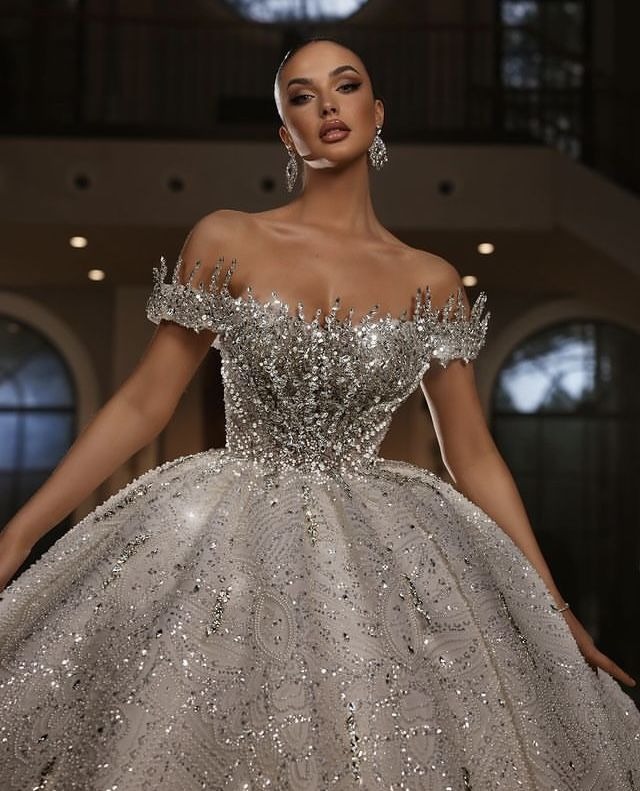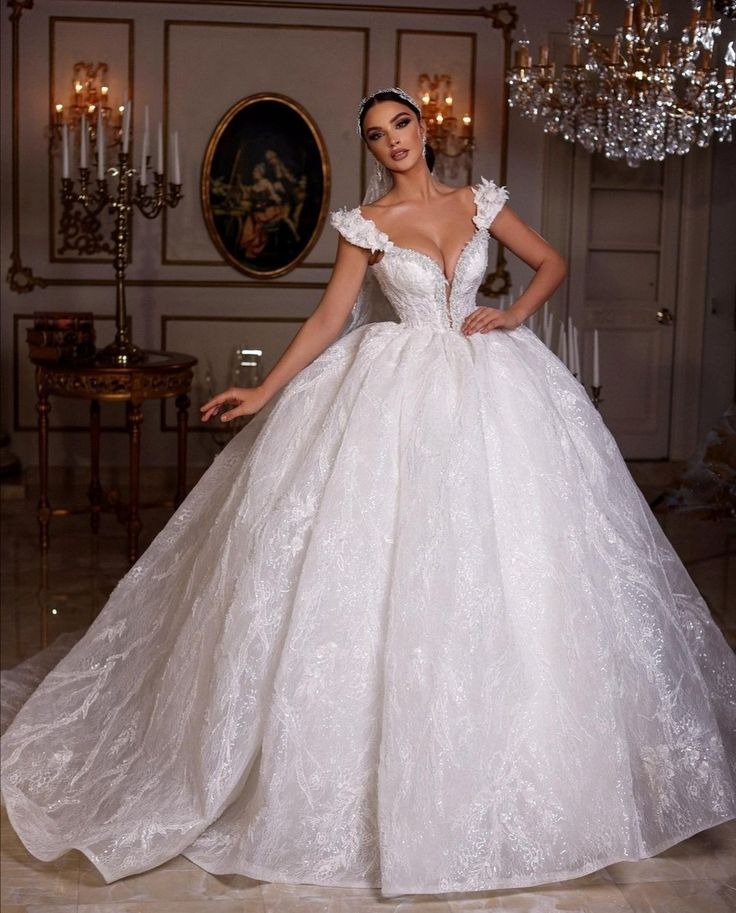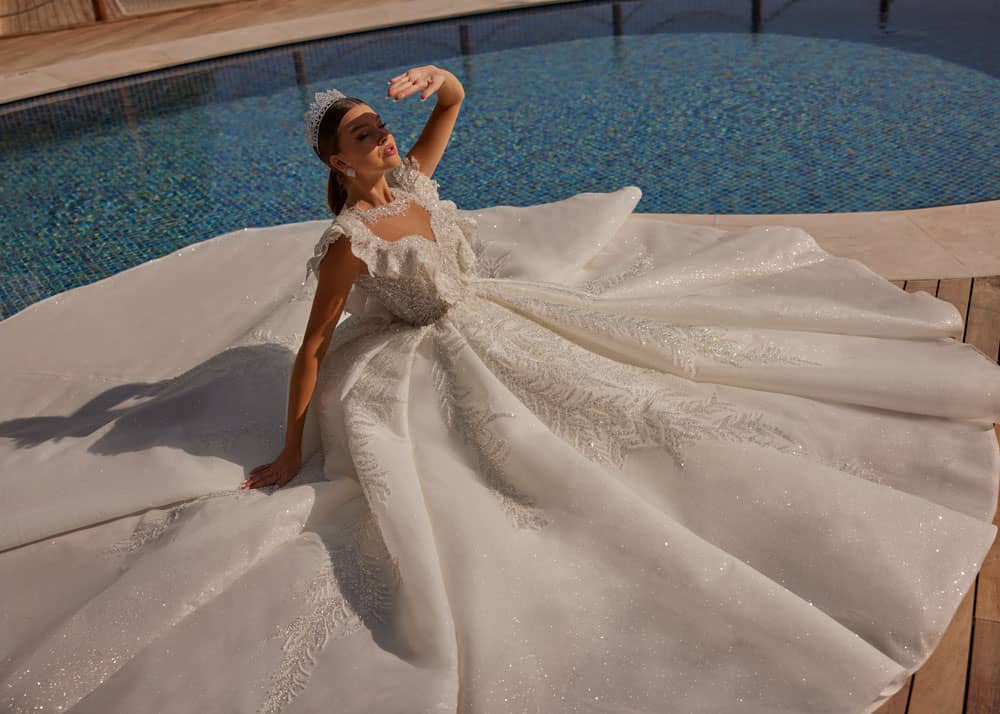
Turkish Wedding Dress Manufacturers Turkey has emerged as a global leader in the wedding dress industry, renowned for its blend of traditional craftsmanship and modern design innovation. From intricate lacework to luxurious fabrics, Turkish wedding dresses cater to diverse tastes, making the country a go-to destination for brides worldwide. Manufacturers like Metropol Wedding Dress and designers like Tarik Ediz have elevated Turkey’s status in the bridal fashion market. This article explores the history, key players, design trends, and economic impact of Turkish wedding dress manufacturing, showcasing why Turkey is a powerhouse in the global bridal industry.
Historical Context
The roots of Turkey’s wedding dress industry lie in its rich textile heritage, dating back to the Ottoman Empire. During the Ottoman era, textiles were a symbol of wealth, with silk, velvet, and gold embroidery adorning garments for special occasions. Bridal attire was particularly elaborate, featuring handwoven fabrics and intricate patterns that reflected cultural and regional diversity. The Industrial Revolution in the 19th century modernized Turkey’s textile sector, introducing mechanized looms and increasing exports to Europe. By the 20th century, Turkey’s textile industry had become a cornerstone of its economy, with wedding dress manufacturing emerging as a specialized niche.
In the early 2000s, companies like Metropol Wedding Dress, founded in 2004 in Izmir, began focusing on high-quality bridal gowns for both domestic and international markets. The combination of skilled artisans, affordable labor, and access to premium fabrics allowed Turkish manufacturers to compete globally. Today, Turkey’s wedding dress industry is a fusion of its historical craftsmanship and modern production techniques, producing gowns that appeal to brides from Europe, the Middle East, and beyond.
Key Manufacturers and Designers
Turkey boasts a vibrant ecosystem of wedding dress manufacturers and designers, each contributing to the industry’s global reputation. Below are some of the most prominent players:
Manufacturers
- Metropol Wedding Dress: Established in 2004 in Konak, Izmir, Metropol is a leading wholesaler with a 1,200 m² production facility. Known for its intricate designs and wide range of styles, Metropol exports to Europe and Asia, offering both traditional and modern gowns. Their catalog includes princess, A-line, and fishtail dresses, often adorned with embroidery and lace.
- Amarya Bridal: As Turkey’s top wedding dress wholesaler, Amarya specializes in designer-quality gowns at competitive prices. Their focus on bulk orders makes them a favorite among retailers in the Middle East and Europe.
- Bluma Moda: Based in Istanbul, Bluma Moda manufactures custom wedding and evening dresses. Their showrooms in Şirinevler Square attract international buyers, offering bespoke designs with luxurious fabrics.
Designers
- Gül Hürgel: Known for romantic, whimsical designs, Hürgel’s dresses feature floral prints, vintage silhouettes, and delicate details like ruffles and lace. Her creations appeal to brides seeking a fairytale aesthetic.
- Tarik Ediz: A master of glamorous and daring designs, Ediz’s gowns are characterized by intricate beading, plunging necklines, and dramatic silhouettes. His collections are popular among brides wanting a show-stopping look.
- Dilek Hanif: Renowned for opulent gowns, Hanif’s designs feature voluminous skirts, exquisite beadwork, and luxurious fabrics. Her work exudes grandeur, making her a favorite for high-profile weddings.
- Gülçin Çengel: A rising star, Çengel’s contemporary designs incorporate unconventional fabrics and unique silhouettes, appealing to brides seeking individuality.
These manufacturers and designers leverage Turkey’s skilled workforce and textile expertise to produce gowns that rival those from Western fashion capitals, often at a fraction of the cost.
Design Trends and Styles
Turkish wedding dresses are celebrated for their diversity, blending traditional elegance with modern trends. Key styles include:
- Princess/Ball Gown: Characterized by a fitted bodice and voluminous skirt, this style is ideal for brides seeking a regal look. Embellishments like pearls, sequins, and embroidery enhance its grandeur.
- A-Line: Flattering for most body types, A-line dresses feature a fitted bodice that flares out into a skirt, resembling the letter “A.” They often include lace overlays and subtle beadwork.
- Mermaid/Fishtail: These figure-hugging gowns flare out at the knees, accentuating curves. Turkish designers like Tarik Ediz excel in this style, incorporating plunging necklines and intricate lace.
- Minimalist/Modern: Designers like Nihan Peker focus on sleek, elegant designs with clean lines and minimal embellishments, appealing to contemporary brides.
Traditional Turkish dresses often feature gold embroidery and luxurious fabrics like silk and satin, reflecting Ottoman influences. Modern designs incorporate global trends, such as off-shoulder necklines and illusion backs. Lace, a hallmark of Turkish bridal fashion, is sourced from local textile hubs and adds a delicate, timeless touch.
Turkish Wedding Dress Manufacturers
The wedding dress industry is a significant contributor to Turkey’s textile sector, which accounts for a substantial portion of the country’s exports. In 2023, Turkey’s textile and apparel exports reached $28 billion, with wedding dresses forming a growing segment. Manufacturers like Metropol and Amarya export to over 20 countries, including Germany, the UK, and Saudi Arabia.
Turkey’s competitive pricing, driven by affordable labor and favorable exchange rates, makes its wedding dresses accessible to a wide market. For example, a high-quality gown from Metropol may cost $500–$1,500, compared to $3,000–$5,000 for similar designs in Europe or the US. This affordability, combined with superior craftsmanship, has made Turkey a hub for bridal tourism, with brides traveling to Istanbul and Izmir to purchase gowns.
The industry also supports thousands of jobs, from artisans to factory workers. Turkey’s strategic location at the crossroads of Europe and Asia facilitates trade, enabling manufacturers to cater to diverse cultural preferences. For instance, Middle Eastern brides often favor ornate, beaded gowns, while European brides lean toward minimalist designs.
Craftsmanship and Materials
Turkish wedding dresses are renowned for their craftsmanship, rooted in centuries-old textile traditions. Skilled artisans, trained in embroidery, lacework, and tailoring, bring designs to life with meticulous attention to detail. Manufacturers like Metropol use advanced textile technology alongside handcrafting techniques to ensure durability and beauty.
High-quality fabrics, such as silk, tulle, and satin, are sourced from Turkey’s textile hubs in Bursa and Istanbul. Lace, a staple in bridal gowns, is often handwoven or machine-made with intricate patterns. Gold and silver embroidery, inspired by Ottoman motifs, adds a luxurious touch. The availability of premium materials at competitive prices allows manufacturers to offer diverse designs without compromising quality.
Challenges and Future Trends
Despite its success, the Turkish wedding dress industry faces challenges. Intense competition from countries like China and India, which offer lower labor costs, threatens market share. Additionally, rising demand for sustainable fashion requires manufacturers to adopt eco-friendly materials and practices, which can increase production costs.
Looking ahead, the industry is poised for growth. Trends like customizable gowns and digital design tools are gaining traction, allowing brides to personalize their dresses. Sustainability is also shaping the future, with designers exploring organic fabrics and recycled materials. Turkish manufacturers are likely to maintain their global edge by balancing innovation with their rich craftsmanship heritage.
Conclusion
Turkey’s wedding dress industry is a testament to the country’s textile legacy and entrepreneurial spirit. With world-class manufacturers, talented designers, and a commitment to quality, Turkey continues to captivate brides worldwide. As the industry evolves, it will undoubtedly remain a leader in the global bridal market, blending tradition with innovation.
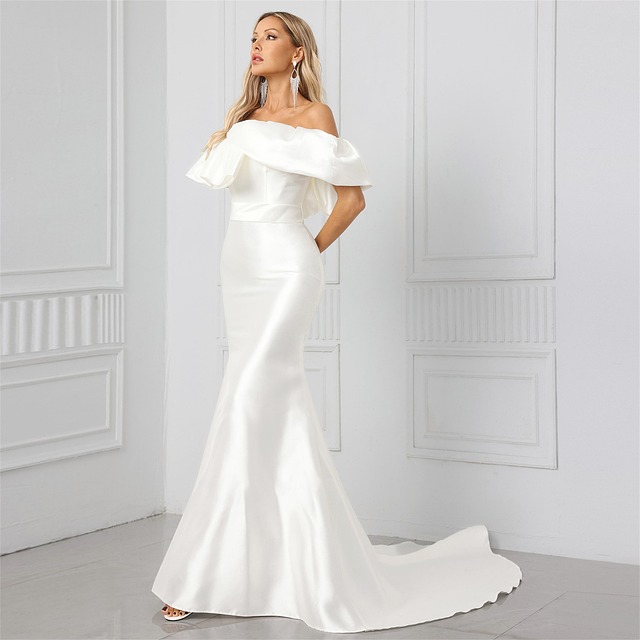
Wedding dress Turkey online shop
Here are some reputable online shops based in Turkey or specializing in Turkish wedding dresses, offering a range of styles from traditional to modern designs:
- Istanbul Fashion Center (istanbulfashioncenter.com)
- Offers wholesale wedding dresses for retailers and boutiques, featuring 2025 models with diverse styles, sizes, and fabrics. Known for competitive prices, high-quality craftsmanship, and bulk ordering options with customization. Ideal for businesses looking to stock bridal collections.
- Amarya Bridal (amaryabridal.com)
- Turkey’s leading wholesaler for wedding and evening dresses. Provides designer-quality gowns at competitive prices, with a focus on lace, beaded, and mermaid-style dresses. Offers customization for bespoke designs, catering to brides and retailers globally.
- Abiyefon (en.abiyefon.com)
- A major Turkish online retailer offering wedding dresses, evening gowns, and accessories. Known for affordable prices, fast worldwide shipping, and a variety of styles, including plus-size options. They also run frequent sales and discount campaigns.
- Metropol Wedding Dress (metropolweddingdress.com)
- Specializes in glamorous, high-quality wedding dresses with intricate beadwork and bold silhouettes. Offers both retail and wholesale options, with international shipping and custom designs in all sizes. Brides can browse online or visit their Turkey store.
- BuGelinlik (bugelinlik.com)
- Focuses on custom-made wedding dresses tailored to your body measurements. You can upload a photo for a dress to be recreated identically, with a satisfaction guarantee. Based in Istanbul, they offer trendy 2024/2025 designs at various price points.
- ModaNisa & Trendyol (visitturkey.in)
- Popular Turkish e-commerce platforms offering a wide range of wedding dresses, from budget-friendly to luxury custom-made gowns. They cater to diverse tastes with traditional and modern styles, accessible worldwide via online shopping.
Tips for Shopping:
- Styles: Turkish dresses often feature intricate lace, embroidery, and luxurious fabrics like satin, tulle, or organza. Popular styles include A-line, mermaid, bohemian, and modest designs with long sleeves or high necklines.
- Customization: Many shops offer bespoke services, allowing you to adjust designs, sizes, or fabrics. Check for free custom sizing or detailed size guides.
- Shipping: Most provide international shipping, but confirm delivery times (9-15 weeks recommended for custom orders).
- Budget: Prices vary widely, from affordable options at markets like the Grand Bazaar to high-end bespoke gowns. Check for sales on platforms like Abiyefon or AliExpress for deals.
Additional Notes:
- For a traditional shopping experience, Istanbul’s Grand Bazaar or Nişantaşı district are renowned for bridal fashion, though these are more in-person.
- Always verify measurements, as sizing may differ (e.g., Asian sizes may run smaller, so size up if needed).
- Read customer reviews on platforms like AliExpress or DHgate for quality assurance, especially for budget buys.
If you’re looking for something specific (e.g., a style, budget, or delivery timeline), let me know, and I can narrow it down further!
Import wedding dresses from Turkey
Importing wedding dresses from Turkey involves several steps and considerations to ensure a smooth and cost-effective process. Turkey is a leading destination for high-quality, affordable wedding dresses due to its skilled artisans, advanced textile industry, and competitive pricing. Below is a comprehensive guide to help you import wedding dresses from Turkey:
Why Import Wedding Dresses from Turkey?
- High Quality: Turkish wedding dresses are known for exquisite craftsmanship, intricate lacework, and luxurious fabrics like silk, tulle, and satin.
- Affordability: Prices typically range from $100 to $2,500 per piece, depending on fabric, design, and craftsmanship, making them more cost-effective than many European markets.
- Variety: Turkey offers a wide range of styles, from traditional to modern, including mermaid, A-line, and princess designs, catering to diverse tastes.
- Bulk Buying Benefits: Wholesale purchasing reduces production costs, allowing significant discounts for retailers and boutique owners.
- Global Reputation: Turkey’s fashion industry is prominent, with brands like Abbride Bridal, Bella Vista, and White House Bridal available through platforms like Istanbul Fashion Center.
Steps to Import Wedding Dresses from Turkey
1. Research and Identify Suppliers
- Find Reputable Manufacturers and Wholesalers:
- Use B2B platforms like:
- Istanbul Fashion Center (istanbulfashioncenter.com): Offers a wide selection of 2025 wedding dress models for bulk buyers.
- TurkishExporter.com.tr: Lists export companies like Nellie Bridal and Hocazade Gelinlik, specializing in wedding dresses.
- Alibaba.com: Connects you with Turkish manufacturers offering wholesale dresses with minimum order quantities as low as 2-4 pieces.
- Fibre2Fashion.com: Provides access to Turkish bridal dress suppliers with detailed catalogs.
- Amarya Bridal (amaryabridal.com): A leading wholesaler for designer-quality wedding and evening dresses.
- Check for suppliers with experience exporting to your country to ensure compliance with international standards.
- Visit Key Markets in Istanbul:
- Fatih Area: Known for numerous shops selling wedding and evening dresses at competitive prices, ideal for wholesale purchases.
- Osmanbey Market: Popular for premium wedding dresses and evening gowns, including second-hand options.
- Laleli Area: Offers a variety of dress styles suitable for different tastes and budgets.
- SkyCamera Store (Piazeit, Istanbul): Specializes in diverse wedding dress models at affordable prices.
- Work with Import Agencies:
- Companies like Tebadul International Trade (tebadul.com) provide end-to-end services, including supplier selection, customs clearance, and shipping.
- Importing-house.com offers connections to top factories and markets in Turkey.
2. Verify Supplier Credentials
- Ensure suppliers are legitimate by requesting:
- Business License: Confirm they are registered with the Turkish Chamber of Commerce.
- Export Experience: Check if they have exported to your country and are familiar with regulations.
- Customer Reviews: Look for testimonials or ratings on platforms like Alibaba or Fibre2Fashion.
- Request samples to evaluate quality, craftsmanship, and fabric before placing bulk orders.
3. Understand Import Requirements
- Necessary Documentation (as required by Turkish authorities):
- Certificate of Origin: Approved by the Turkish Chamber of Commerce, proving the dresses are made in Turkey.
- Product Approval Certificate: Issued by the Turkish Ministry of Commerce, verifying compliance with standard specifications.
- Trade Invoice: Certified by Turkish trade authorities, detailing the transaction.
- Shipping Policy: A document confirming receipt of goods by shipping companies.
- Penal Terms Agreement: Outlines penalties for late or non-delivery.
- Customs Regulations in Your Country:
- Check import duties, taxes, and restrictions for textiles in your country. For example, in the U.S., wedding dresses may face tariffs of 8-12% depending on fabric (HS code 6204.43 for synthetic fiber dresses).
- Consult a customs broker to ensure compliance with local regulations.
- Labeling Requirements: Ensure dresses meet labeling standards (e.g., fabric content, care instructions, country of origin) for your market.
4. Negotiate Terms and Place Orders
- Pricing: Negotiate based on order volume, fabric type, and design complexity. Wholesale prices typically range from $10 for simple evening dresses to $2,500 for high-end bridal gowns.
- Minimum Order Quantities (MOQs): Some suppliers require MOQs (e.g., 2-100 pieces on Alibaba), while others, like Atelier Mila, offer made-to-measure orders with no minimum.
- Customization: Many Turkish manufacturers, like Couture Eye, offer bespoke designs tailored to your specifications.
- Payment Terms: Use secure methods like bank transfers or escrow services (available on Alibaba). Avoid full upfront payments until supplier reliability is confirmed.
5. Arrange Shipping and Logistics
- Shipping Options:
- Air Freight: Fast (2-4 days via DHL Worldwide Express) but expensive, ideal for small, high-value orders.
- Sea Freight: Cost-effective for bulk orders but slower (2-6 weeks depending on destination).
- Land Shipping: Viable for nearby countries (e.g., Middle East or Europe).
- Packaging: Ensure dresses are packed securely to prevent damage. Tebadul offers accurate packaging services for delicate items.
- Customs Clearance: Work with suppliers like Tebadul that provide customs clearance services, or hire a freight forwarder to handle documentation and duties.
6. Market and Sell the Dresses
- Target Audience: Bridal boutiques, online retailers, or event planners seeking affordable, high-quality gowns.
- Marketing: Highlight the craftsmanship, variety, and cost-effectiveness of Turkish dresses. Use social media to showcase designs, as seen in posts on X promoting Turkish dresses.
- Compliance: Ensure dresses meet local safety and quality standards (e.g., flame-retardant fabrics if required).
Key Places to Source Wedding Dresses in Turkey
- Factories:
- Gebze Factory: Specializes in luxurious wedding and evening dresses at economical prices.
- Akay (since 1974): A renowned brand offering diverse styles through trademarks like G.B.S. Gelincik Moda and Biryıldız Bridal.
- Atelier Mila (Istanbul): Produces A-line, mermaid, and princess dresses with custom measurements.
- Online Platforms:
- DreamON: Offers handcrafted bridal gowns and evening dresses, available in 46 Turkish cities and 22 countries.
- Abiyefon: Specializes in special occasion dresses, including wedding gowns, with worldwide shipping.
- AliExpress: Features Turkish dresses with discounts and free shipping on qualifying orders.
- Markets:
- Taksim Square Market: Offers luxurious dresses with high demand from tourists and locals.
- Fatih Street: Historical area with shops catering to Arab tastes, ideal for wholesale.
Tips for Success
- Visit Turkey: If possible, attend trade shows or visit markets in Istanbul to negotiate directly with suppliers and inspect quality.
- Start Small: Test the market with a small order to assess supplier reliability and customer demand.
- Leverage Trends: Turkish designers cater to Arab and international tastes, so focus on popular styles like mermaid dresses or hijab-friendly designs.
- Check Certifications: Ensure suppliers provide ISO or similar quality certifications for textiles.
- Monitor Costs: Factor in shipping, duties, and currency exchange rates (Turkish Lira to your currency) when calculating profitability.
Challenges and Solutions
- Challenge: Language barriers with suppliers.
- Solution: Use translation tools or hire a local agent familiar with Turkish and your language.
- Challenge: Delays in shipping or customs.
- Solution: Work with experienced freight forwarders and suppliers like Tebadul that guarantee timely delivery.
- Challenge: Quality inconsistencies.
- Solution: Request samples and include quality clauses in contracts.
Additional Resources
- Customs Information: Check your country’s customs service website (e.g., U.S. Customs Service at cbp.gov).
- Trade Shows: Attend events like the Istanbul Fashion Fair to connect with suppliers.
- xAI API: For advanced sourcing, explore xAI’s API services for market research and supplier data (x.ai/api).
By following these steps and leveraging Turkey’s robust bridal fashion industry, you can successfully import high-quality wedding dresses at competitive prices. If you need specific supplier recommendations or assistance with customs regulations in your country, please provide more details, and I can tailor the guidance further!
Wedding dresses Turkey
Turkey is a top destination for wedding dresses, blending tradition, craftsmanship, and modern style at competitive prices. Here’s a concise overview based on current information:
Why Choose Turkish Wedding Dresses?
- Quality Craftsmanship: Turkey is renowned for its skilled artisans, high-quality textiles, and advanced manufacturing. Dresses often feature intricate embroidery, delicate lace, and luxurious fabrics like silk, tulle, and satin.
- Affordability: Bulk buying or direct purchases from manufacturers in Turkey offer significant cost savings, with wholesale prices often lower than retail elsewhere due to reduced production costs.
- Variety: From traditional Ottoman-inspired gowns to modern minimalist designs, Turkish designers cater to diverse tastes. Styles include A-line, mermaid, ball gowns, and two-piece sets, with options for modest, bohemian, or glamorous looks.
- Cultural Heritage: Designs often incorporate East-West influences, featuring hand-embroidered details and vibrant colors like red, symbolizing joy and prosperity in Turkish culture.
Where to Shop
- Istanbul: The hub for bridal fashion, with luxury boutiques in areas like Nişantaşı and bustling markets like the Grand Bazaar offering both high-end and budget-friendly options. Designers like Tarik Ediz, Vakko Wedding, and Gül Hürgel are based here.
- Izmir: Home to manufacturers like Metropol Wedding Dress, known for custom and ready-to-wear gowns.
- Online Platforms: Websites like Istanbul Fashion Center, Amarya Bridal, and Alibaba offer wholesale and retail options with global shipping. AliExpress provides budget-friendly dresses with free shipping promotions.
Popular Styles
- Traditional: Ottoman-style dresses with rich embroidery, vibrant colors (red, gold), and elaborate headdresses.
- Modern: Sleek A-line or mermaid silhouettes with minimalist designs or bold details like plunging necklines and 3D floral fabrics.
- Modest: High necklines, long sleeves, and full skirts with elegant lace, popular for religious ceremonies.
- Custom Options: Boutiques like Couture Eye and Metropol offer tailored gowns, with delivery in 1-45 days depending on order size.
Key Designers and Brands
- Tarik Ediz: Glamorous, bold designs with intricate beading.
- Gül Hürgel: Romantic, vintage-inspired gowns with floral details.
- Nihan Peker: Minimalist, modern elegance with clean lines.
- Metropol Wedding Dress: Izmir-based, offering custom and wholesale options since 2004.
- Istanbul Fashion Center: Europe’s largest B2B wholesale center for bulk orders.
Tips for Buyers
- Wholesale for Boutiques: Retailers can source dresses in bulk from Istanbul Fashion Center or Metropol for cost-effective inventory. Check catalogs for 2025 models.
- Custom Orders: Contact designers like Couture Eye for bespoke gowns, ensuring clear communication (many speak English/Arabic).
- Markets for Budget Shoppers: Grand Bazaar or Laleli offer affordable dresses and accessories.
- Online Shopping: Use AliExpress or Amarya Bridal for deals, filtering for free shipping or fast delivery. Read reviews to ensure quality.
Pricing
- Prices vary by design and fabric. Wholesale dresses can start as low as $100-$300 for bulk orders, while custom or designer gowns range from $500-$3,000+. Online platforms like eBay list second-hand or custom dresses around $1,000-$3,000.
Additional Notes
- Shipping: Many suppliers offer express shipping (2-10 days to Europe/USA for urgent orders).
- Cultural Events: Red dresses or kaftans are popular for henna nights or cultural ceremonies.
- For detailed pricing on subscriptions like SuperGrok or x.com premium, check https://x.ai/grok or https://help.x.com/en/using-x/x-premium. For API services, visit https://x.ai/api.
If you’re looking for specific designers, styles, or shopping locations, let me know, and I can dig deeper or provide tailored recommendations!
Wedding dress shopping Istanbul
Turkey is a top destination for wedding dresses, blending tradition, craftsmanship, and modern style at competitive prices. Here’s a concise overview based on current information:
Why Choose Turkish Wedding Dresses?
- Quality Craftsmanship: Turkey is renowned for its skilled artisans, high-quality textiles, and advanced manufacturing. Dresses often feature intricate embroidery, delicate lace, and luxurious fabrics like silk, tulle, and satin.
- Affordability: Bulk buying or direct purchases from manufacturers in Turkey offer significant cost savings, with wholesale prices often lower than retail elsewhere due to reduced production costs.
- Variety: From traditional Ottoman-inspired gowns to modern minimalist designs, Turkish designers cater to diverse tastes. Styles include A-line, mermaid, ball gowns, and two-piece sets, with options for modest, bohemian, or glamorous looks.
- Cultural Heritage: Designs often incorporate East-West influences, featuring hand-embroidered details and vibrant colors like red, symbolizing joy and prosperity in Turkish culture.
Where to Shop
- Istanbul: The hub for bridal fashion, with luxury boutiques in areas like Nişantaşı and bustling markets like the Grand Bazaar offering both high-end and budget-friendly options. Designers like Tarik Ediz, Vakko Wedding, and Gül Hürgel are based here.
- Izmir: Home to manufacturers like Metropol Wedding Dress, known for custom and ready-to-wear gowns.
- Online Platforms: Websites like Istanbul Fashion Center, Amarya Bridal, and Alibaba offer wholesale and retail options with global shipping. AliExpress provides budget-friendly dresses with free shipping promotions.
Popular Styles
- Traditional: Ottoman-style dresses with rich embroidery, vibrant colors (red, gold), and elaborate headdresses.
- Modern: Sleek A-line or mermaid silhouettes with minimalist designs or bold details like plunging necklines and 3D floral fabrics.
- Modest: High necklines, long sleeves, and full skirts with elegant lace, popular for religious ceremonies.
- Custom Options: Boutiques like Couture Eye and Metropol offer tailored gowns, with delivery in 1-45 days depending on order size.
Key Designers and Brands
- Tarik Ediz: Glamorous, bold designs with intricate beading.
- Gül Hürgel: Romantic, vintage-inspired gowns with floral details.
- Nihan Peker: Minimalist, modern elegance with clean lines.
- Metropol Wedding Dress: Izmir-based, offering custom and wholesale options since 2004.
- Istanbul Fashion Center: Europe’s largest B2B wholesale center for bulk orders.
Tips for Buyers
- Wholesale for Boutiques: Retailers can source dresses in bulk from Istanbul Fashion Center or Metropol for cost-effective inventory. Check catalogs for 2025 models.
- Custom Orders: Contact designers like Couture Eye for bespoke gowns, ensuring clear communication (many speak English/Arabic).
- Markets for Budget Shoppers: Grand Bazaar or Laleli offer affordable dresses and accessories.
- Online Shopping: Use AliExpress or Amarya Bridal for deals, filtering for free shipping or fast delivery. Read reviews to ensure quality.
Pricing
- Prices vary by design and fabric. Wholesale dresses can start as low as $100-$300 for bulk orders, while custom or designer gowns range from $500-$3,000+. Online platforms like eBay list second-hand or custom dresses around $1,000-$3,000.
Additional Notes
- Shipping: Many suppliers offer express shipping (2-10 days to Europe/USA for urgent orders).
- Cultural Events: Red dresses or kaftans are popular for henna nights or cultural ceremonies.
- For detailed pricing on subscriptions like SuperGrok or x.com premium, check https://x.ai/grok or https://help.x.com/en/using-x/x-premium. For API services, visit https://x.ai/api.
If you’re looking for specific designers, styles, or shopping locations, let me know, and I can dig deeper or provide tailored recommendations!
Modest Wedding Dresses Turkish
Turkish modest wedding dresses blend elegance, tradition, and contemporary style, catering to brides seeking sophisticated yet culturally resonant gowns. These dresses often feature high necklines, long sleeves, and full skirts, adorned with intricate lace, hand-embroidered patterns, floral motifs, or bead embellishments, reflecting both modesty and opulence. Popular fabrics include satin, tulle, silk, and velvet, with designs ranging from minimalist to Ottoman-inspired grandeur, characterized by long trains and rich embroidery. Red dresses, symbolizing joy and prosperity, are culturally significant, often paired with gold accents or elaborate headdresses.
Key designers like Gül Hürgel offer romantic, vintage-inspired silhouettes, while Tarik Ediz creates bold, glamorous gowns. Nihan Peker focuses on modern minimalism, and Dilek Hanif crafts luxurious, voluminous dresses. Retailers can source these through Istanbul Fashion Center, Europe’s largest B2B wholesale hub, offering brands like Abbride Bridal and Bella Vista at competitive prices with no middlemen. Online platforms like Modanisa, Neva-style.com, and Amarya Bridal provide diverse options, including plus-size and hijab-friendly dresses, with worldwide shipping. For example, Neva-style’s Ecru Hijab Wedding Dress 22070E is made of 100% polyester and suited for various occasions.
For boutiques, bulk buying from Turkey ensures affordability, quality craftsmanship, and variety, with fast delivery to meet market demands. Brides can explore Alibaba, AliExpress, or Turkish Souq for retail purchases, though language barriers may require translation tools when navigating local shops in Istanbul’s Fatih or Nisantasi districts.
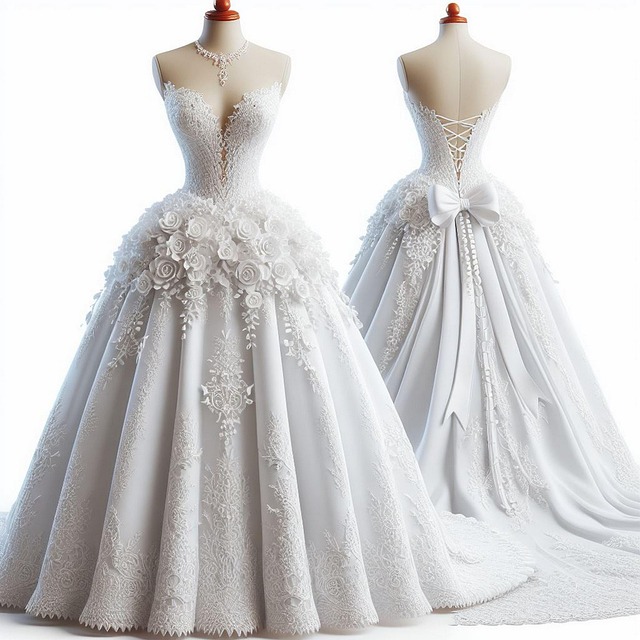
Turkey bridal
I’m assuming you’re asking about Turkish bridal traditions or wedding customs in Turkey, possibly related to the bride’s role, attire, or ceremonies. If you meant something else (e.g., a specific bridal event, fashion, or even “Turkey” as a typo), please clarify, and I’ll tailor the response! Below is a concise overview of Turkish bridal traditions, focusing on the bride’s experience, based on common cultural practices. I’ve incorporated relevant information from web sources for accuracy.
Turkish Bridal Traditions
Turkish weddings are vibrant, steeped in centuries-old customs that blend tradition with modern influences. The bride is central to many rituals, which vary by region but share common themes of family, community, and symbolism for luck and prosperity.
Pre-Wedding Traditions
- Kız İsteme (Asking for the Bride’s Hand):
- Söz Kesmek (Promise Ceremony):
- Kına Gecesi (Henna Night):
- Held the night before the wedding, this women-only celebration is a highlight for the bride.
- The bride wears a red or ornate dress, often a traditional “bindallı” with gold embroidery, and a red veil symbolizing luck and protection from evil.
- Henna is applied to the bride’s palms (and sometimes the groom’s pinky) by a happily married woman, believed to bring prosperity and ward off misfortune. A gold coin is placed in the bride’s hand to encourage her to open it, symbolizing wealth.
- Traditional songs are sung, and the bride is encouraged to cry, symbolizing her emotional farewell to her family and single life.
- Çeyiz (Dowry):
Wedding Day Traditions
- Gelin Alma (Bridal Pickup):
- The groom and his entourage, often accompanied by musicians playing the davul (drum) and zurna (wind instrument), arrive at the bride’s home to “fetch” her.
- The bride’s father or brother ties a red ribbon around her waist, symbolizing purity, luck, and wealth.
- A convoy of cars follows the bridal car, with honking and music, and children may block the road for small tips from the couple.
- Bridal Attire:
- Traditionally, brides wore colorful, ornate dresses (e.g., red or purple with gold), but white dresses with veils are now common, often adorned with red ribbons or sashes for luck.
- In some regions, the bride changes into a traditional gown during the reception, reflecting Ottoman influences.
- A red veil may cover her face when leaving her family home, believed to protect against bad energy.
- Ceremony Rituals:
- Turkish weddings may include a civil ceremony (legally binding) or a religious one (requiring an imam and witnesses). Many couples do both.
- During the civil ceremony, the bride and groom may step on each other’s feet after saying “I do,” a playful superstition where the first to step gains dominance in the marriage.
- The bride may look in a mirror before leaving her home, symbolizing a long, happy marriage.
- Reception and Gifts:
- Guests pin gold coins or banknotes to the bride’s dress or a ribbon around the couple’s necks during congratulations, a tradition to wish prosperity.
- The bride’s single friends write their names on the soles of her shoes. Names that wear off by the end of the night suggest the friend will marry soon.
- Traditional dances like the Halay, accompanied by davul and zurna, are a staple, with the bride often joining in.
Why Brides May Appear Sad
- Turkish brides often cry during the henna night or wedding, reflecting the emotional weight of leaving their family. This is especially true in rural areas or arranged marriages, where the bride may have less choice.
- The folk song “Yüksek, Yüksek Tepelere” (about a girl marrying far from home) is sung to evoke these emotions, marking the transition from her parental home.
Regional Variations
- In rural areas, weddings may last days, involving entire communities, while urban “salon weddings” are shorter, resembling Western styles.
- Specific customs vary: in Antalya, a “bridal bath” feast occurs at a hammam; in Trabzon, horon dances are key; in Muğla, “belly throwing” is a tradition.
Modern Influences
- While traditions like henna night persist, many brides now choose white dresses, love marriages are more common, and some opt for simpler ceremonies or elopements.
- Social media and Western influences have popularized extravagant venues like hotels or ships.
Notes
- Cultural Sensitivity: Some traditions (e.g., red ribbons symbolizing virginity) are debated and less common in modern or urban settings.
- Attending a Wedding: If you’re invited, wear formal, bright attire (avoid red/pink, reserved for the bride), and expect dancing and gift-giving (gold coins or cash). Alcohol may be limited or absent.
- Sources: The information draws from cultural websites and firsthand accounts, ensuring a broad perspective.
Turkish Wedding Dress Wholesale Online 2025 Prices
Based on your query, you’re looking for information on wholesale Turkish wedding dresses available online, specifically for 2025 models and their prices. Below is a concise overview focusing on sourcing options, price ranges, and key suppliers, drawing from relevant web sources for accuracy. If you need specific details (e.g., a particular style, supplier, or region), let me know!
Overview of Turkish Wedding Dress Wholesale
Turkey, particularly Istanbul, is a global hub for bridal fashion due to its skilled artisans, advanced textile industry, and competitive pricing. Turkish wedding dresses are known for blending traditional craftsmanship (e.g., intricate lace, embroidery) with modern designs (e.g., A-line, mermaid, minimalist gowns). Wholesale purchasing online allows retailers and boutique owners to access high-quality dresses at factory-direct prices, ideal for stocking diverse bridal collections.
Key Online Wholesale Suppliers for 2025
Here are some prominent platforms and manufacturers offering Turkish wedding dresses for wholesale in 2025, based on available data:
- Description: Europe’s largest B2B fashion wholesale center, based in Istanbul, offering over 4,000 dress models, including wedding and evening gowns. Features brands like Abbride Bridal, Bella Vista, and White House Bridal.
- Styles: A-line, ball gowns, mermaid, minimalist, and Ottoman-inspired dresses with luxurious fabrics (silk, satin, tulle, lace) and embellishments (Swarovski crystals, beading).
- Ordering: Online platform with detailed catalogs, size options, and customization. Bulk orders with no middlemen ensure competitive pricing.
- Price Range: $100–$2,500 per dress, depending on fabric, design complexity, and embellishments (e.g., handmade lace or couture details increase costs).
- Shipping: Fast global shipping, catering to boutiques worldwide.
- Description: Izmir-based manufacturer since 2004, specializing in high-quality, custom-designed wedding dresses for wholesale and retail. Known for intricate lace, embroidery, and diverse fabric options.
- Styles: Traditional and modern designs, including hijab-friendly modest gowns. Offers evening and after-party dresses too.
- Ordering: Custom orders via WhatsApp (+905425198365) or website. Requires a 50% deposit, with delivery in 21–45 days (1–10 days for urgent orders to Europe/USA with extra fees).
- Price Range: Varies by model and lace density; contact for quotes based on design specifications.
- Shipping: Global delivery from Izmir, with a 1,200 m² workshop ensuring quality.
- Description: Turkey’s leading wholesaler for wedding, evening, and prom dresses, offering designer-quality gowns at competitive prices.
- Styles: Lace, beaded, long-sleeve, mermaid, and ball gowns, with options like long trains and sleeveless designs.
- Ordering: Online platform with bulk ordering and customization options.
- Price Range: Not explicitly listed, but competitive for designer-quality dresses; contact for 2025 pricing.
- Description: Online wholesale platform featuring Turkey’s newest wedding dress designs, focusing on luxury fashion at exceptional prices.
- Styles: Large collection with multiple fabrics (lace, tulle, satin) and modest options.
- Ordering: Multiple payment options and easy bulk ordering.
- Price Range: Varies by design; contact for 2025 quotes.
- Description: International marketplace featuring Turkish-inspired wedding dresses from Chinese suppliers, often mimicking Turkish styles (e.g., lace appliques, Arabic/Dubai-inspired designs).
- Styles: Ball gowns, mermaid, A-line, and luxury princess dresses with long sleeves, veils, or cathedral trains.
- Ordering: Bulk deals with coupons/discounts; not directly from Turkish manufacturers but offers similar aesthetics.
- Price Range: $50–$500 per dress, though quality may vary compared to direct Turkish suppliers.
- Description: Turkish manufacturer offering wholesale evening and formal dresses, including bridal options, with a focus on affordable luxury.
- Styles: Elegant gowns with lace, satin, and chiffon, suitable for weddings and special occasions.
- Price Range: Login required for pricing; known for competitive rates with high markups for retailers.
Price Ranges for 2025
- General Range: Wholesale Turkish wedding dresses typically cost $100–$2,500 per piece, influenced by:
- Fabric: Premium materials like silk, satin, tulle, or chantilly lace are pricier than polyester or basic tulle.
- Design Complexity: Minimalist gowns are cheaper ($100–$300), while heavily embroidered or beaded couture pieces (e.g., with Swarovski crystals) can reach $1,000–$2,500.
- Customization: Bespoke designs or specific embellishments increase costs.
- Order Volume: Bulk discounts lower per-unit prices.
- Examples:
- Simple A-line satin gown: ~$100–$200.
- Lace-embellished mermaid dress with train: ~$300–$800.
- Ottoman-inspired silk gown with gold embroidery: ~$1,000–$2,500.
- Note: Prices are approximate and based on 2024–2025 data from sources like Istanbul Fashion Center and Metropol. For exact 2025 pricing, contact suppliers directly, as costs may vary with new collections or economic factors.
Why Choose Turkish Wedding Dresses?
- Quality Craftsmanship: Turkey’s textile industry uses high-quality fabrics and skilled labor, ensuring durability and elegance.
- Competitive Pricing: Lower labor costs compared to Europe/USA make Turkish dresses cost-effective without sacrificing quality.
- Diverse Styles: From traditional Ottoman-inspired gowns (red/gold, embroidered) to modern minimalist or modest designs, catering to global markets (e.g., Middle Eastern, European, North American).
- Customization: Many suppliers offer bespoke services, allowing retailers to tailor designs to their clientele.
- Global Reach: Fast, reliable shipping and online platforms make sourcing easy for international buyers.
Tips for Buying Wholesale Online
- Research Suppliers: Verify reputation via reviews or industry forums. IFC and Metropol are well-established with positive feedback.
- Request Catalogs: Most platforms (e.g., IFC, Metropol) provide detailed 2025 catalogs with pricing upon inquiry.
- Check MOQs: Some suppliers have minimum order quantities (MOQs); confirm if they suit your needs.
- Customization Needs: Specify sizes, colors, or embellishments early, as custom orders may take longer (21–45 days).
- Shipping Costs: Factor in global shipping fees and delivery times (e.g., 1–10 days for urgent orders to Europe/USA).
- Payment Terms: Expect deposits (e.g., 30–50%) for custom/bulk orders, with the balance due on delivery.
- Quality Assurance: Request samples or images of previous work to ensure consistency, especially for high-end designs.
Cultural Context
Turkish wedding dresses often reflect cultural heritage:
- Traditional: Red dresses symbolize joy, prosperity, and fertility, often adorned with gold embroidery or jewels.
- Ottoman-Inspired: Rich fabrics (silk, velvet) with long trains and modest designs (high necklines, long sleeves).
- Modern: White A-line or mermaid gowns with lace, aligning with Western trends but incorporating Turkish craftsmanship.
Notes
- Sources: Information is drawn from reliable web sources like Istanbul Fashion Center, Metropol Wedding Dress, and industry insights from 2024–2025. DHgate listings are included but noted as less authentic to Turkish manufacturing.
- Limitations: Exact 2025 prices may not be fully available until closer to the season. Contact suppliers for updated quotes.
- X Post Reference: A post on X highlighted a budget Turkish bride’s wedding dress costing ~$60 (1,651 TL) in 2025, but this was retail, not wholesale, and reflects simpler designs.
If you need help contacting a specific supplier, comparing styles, or navigating bulk orders, let me know, and I can provide further guidance or search for additional 2025-specific data!


